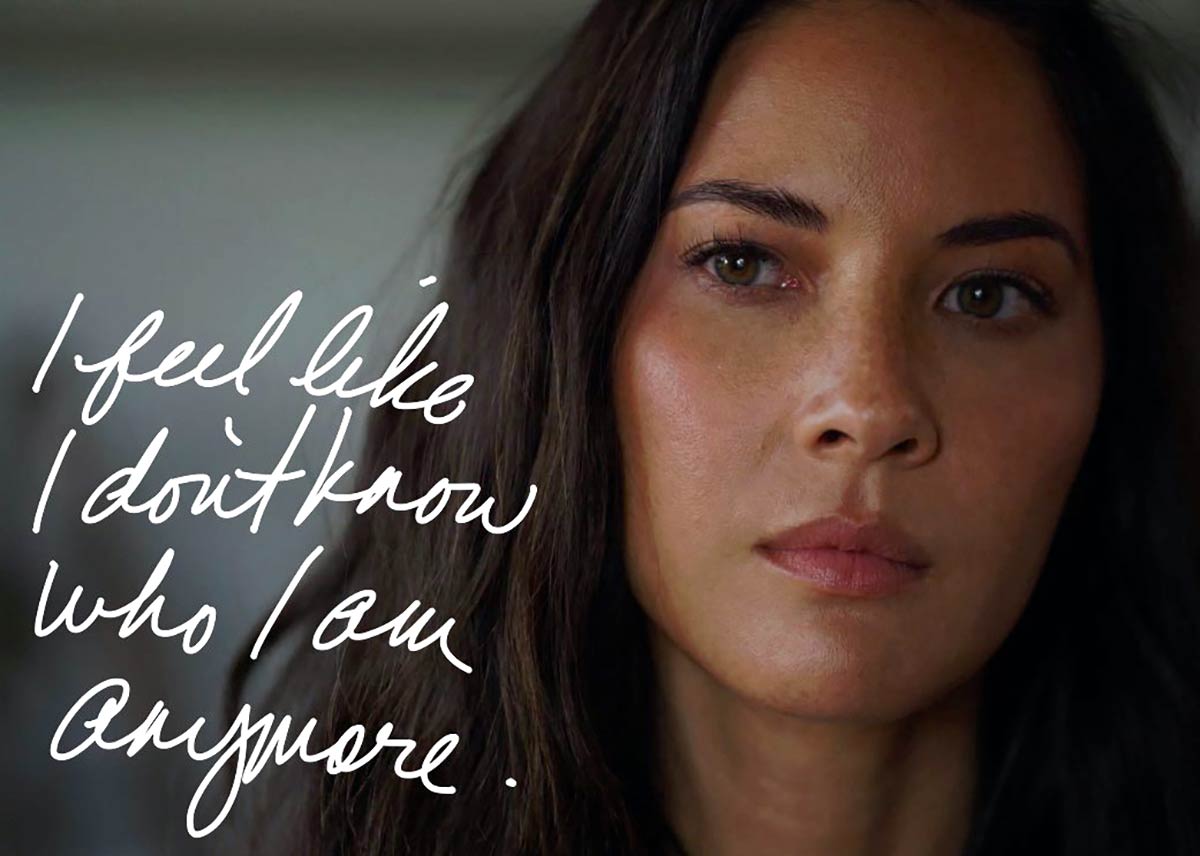You know that voice in your head? The one that calls you a freak, a failure, a baby, or a pig? You try to ignore it, yet it pushes you from a place of fear into making choices you regret. Then, it snarls at you not to look back. A surly Justin Theroux gives this voice life (and voice-over) in Justine Bateman‘s feature directorial debut “Violet,” a mind-bending drama about Hollywood, self-discovery, and battling an inner saboteur.
READ MORE: The 100 Most Anticipated Films Of 2021
Olivia Munn stars as Violet Morton, a 32-year-old movie producer, who has art house dreams but pursues mainstream ambitions. She’s successful, beautiful, and wealthy, yet is racked with constant panic that failure is right around the corner. The voice of her self-doubt–which she calls The Committee–constantly hisses, pushing her away from what she wants. So, she ignores her feelings for a supportive screenwriter (Luke Bracey) and flirts with a smug studio exec (Peter Jacobson). She lets her employees walk all over her, lest she be thought of as not nice, bossy–or even worse–a bitch. But most of all, the voice tells her never to be vulnerable with anyone. Because, what if they reject you?
While the “what ifs” of the cruel Committee plague her in relentless voiceover, Violet’s secret wishes are scribbled across the screen in florid, white cursive. These are the things she can’t dare say aloud, like “I don’t want to be afraid all the time” or “Don’t leave.” As the film progresses, the words themselves become more poetic, scratching together verses about her growing openness, making her feel like her skin is new, raw, and under attack. But that’s not even the half of how Bateman’s screenplay aims to pull Violet’s innermost thoughts out on screen. A violent red wash bleeds over the frame when a moment to be brave has passed in cowardice. There’s a flurry of jarring cutaways to stock footage of things gruesome or glorious, ranging from rotting animal flesh to car crashes, sparkling sunshine, and endless fields of golden grass. Then, to pin her present mental health battle to childhood trauma, there’s a frank flashback about a young Violet, spirited and free, being hollered at by a mother, whose insults echo The Committees.
With all of this, Bateman touches on mental health concepts, like intrusive thoughts and the inner saboteur, as well as cognitive distortions like catastrophizing, downplaying positives, and mind-reading. Essentially, Violet is confronted by the chilling realization that her brain is lying to her, which is a hard lesson to take in. Frustratingly, Bateman doesn’t identify any of these mental health terms, so “Violet” becomes a sloppy crash course in psychology. Its harried heroine lumbers through passive-aggressive business meetings, swanky after-parties, and awkward reunions with the clumsy emotional awareness of a baby elephant. Then, abruptly, she pushes back against the self-defeating voice against her head, though why now is unclear. Bateman’s screenplay has no sharp tipping point, no poignant epiphany moment. So, Violet’s journey feels more jumbled than engaging.
READ MORE: 52 Films Directed By Women To Watch In 2021
Part of the problem may be that Bateman surrounds her protagonist with an army of thinly drawn blandly named stereotypes, from the misogynistic bully of a boss to the chic bestie, the office gossip, the entitled douche-bro, and the dream guy who is defined by being everything Violet needs (sweet, supportive, sexy, handy) exactly when she needs it. A flimsy romance subplot offers little spice, but some dabbling in self-love importance (mental, not physical). Then, Bateman sketches in some family drama with a scowling pair of far-off relatives on top of all this. A potentially fruitful arc about toxic family ties is cut off as it’s treated like a cherry on top of Violet’s self-doubts.
TV actors like Jim O’Heir, Jason Dohring, and Laura San Giacomo pop up in small roles throughout, which offers a spark of energy and a meta thrill. But sadly, Bateman’s leading lady’s performance is drowned out in all her bells and whistles. The red bleed, the voice-over, the cutaways, the cursive, it all serves to shout at the audience about what Violet is feeling, leaving Munn little to do beyond be a background actor while graphics and gimmicks storm into the spotlight. Perhaps a stronger actor may have stood out amid this cacophony meant to represent a mind in turmoil. Munn does not. She brings steely resolve to a second act speech, and a tremble to scenes of tenderness. But mostly, she’s left to play polite, fragile, or staring wistfully into the distance. None of which is spectacular or profound.
In the end, “Violet” feels less like a film than a pitch meeting. A frenzied flurry of ideas, devices, and character sketches chucked out to see what sticks. It’s flashy, but not fascinating, which leaves this drama of inner conflict and deep thoughts feeling horridly shallow. [C]
You can follow along with the rest of our 2021 SXSW coverage here.





